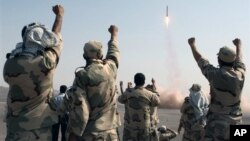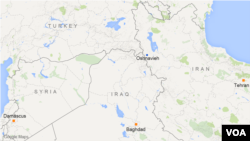Kurdish rebels have been clashing with Iran’s Revolutionary Guard since mid-June in an area along the Iran-Iraq border, according to Iran’s state TV.
Videos on social media also allegedly show Iran shelling positions held by Kurdish rebels.
The fighting, near Oshnavieh, in northern Iran, between the two sides has resulted in the deaths of at least seven Iranian soldiers and a dozen Kurdish rebels, according to the Iranian government. The number of causalities for either side could not be confirmed.
Kurdish fighters, affiliated with the Kurdistan Democratic Party of Iran (KDPI), said they are fighting to force the Iranian government to acknowledge the rights of the Kurdish minority in the country.
Ethnic Kurds make up nearly 9 percent of Iran’s 80 million population. They are largely Sunni Muslims, but their political parties have secular tendencies.
Fighting 'terrorists'
Tehran said the Iranian army is fighting “terrorists” who plan to destabilize the country. It has accused regional powers of providing financial assistance to the Kurdish rebels.
However, Kurdish officials say it was the Iranian military that began the campaign in the Kurdish region.
“We haven’t started the fight,” Miro Aliyar, a leading figure of the KDPI, told VOA. “We are in a defensive position. But we will not let the mullah regime abuse the Kurdish population on a daily basis.”
The Iranian Kurdish rebellion against the government isn’t new. Several Kurdish groups, including those with ties to the Turkey-based Kurdistan Workers’ Party (PKK), have launched military operations against the state.
Analysts say the ongoing conflict between the Iranian government and Kurdish rebels is anything but local. The majority of Iranian Kurdish fighters have been based in Iraq's Kurdistan Region for years. But with the resumption of the conflict, some have returned to the border areas between Iraq and Iran.
In the early 1990s, Iraqi Kurdish groups reached an agreement with Iranian Kurdish groups that they would stop their armed struggle in return for safe refuge in Iraq. The agreement was valid until early this year, when the KDPI announced a military operation against Iranian forces.
Iraqi Kurdish officials are concerned the conflict may damage their relations with Tehran.
“This will affect us [Iraqi Kurds] directly,” said Nazim Dabagh, the Iraqi Kurdistan Region representative to Tehran.
Dabagh told VOA in a telephone interview: “We have told our Iranian Kurdish brothers that armed struggle won’t solve their problems with Iran."
Commercial, political relations
The Kurdish region of Iraq has maintained solid commercial and political relations with Iran. Consequently, Iran has been supportive of the Iraqi Kurds in their fight against the Islamic State militants since the group's rise in 2014.
“We have built a successful experience in Iraqi Kurdistan,” Dabagh told VOA. “We can’t jeopardize it by antagonizing our neighboring countries.”
In a bid to keep the situation under control, the Iranian Revolutionary Guard Corps (IRGC) has reached out to local Kurds for cooperation, said local reporter Ahmad Hedayati, who recently met with Jaafar Ghafarian, the deputy head of IRGC in the Kurdish town of Sarvabad.
The IRGC has also allocated money for programs focused on young Kurds to deter them from joining Kurdish rebels, according to local news reports.
“This is a very extreme shift in IRGC’s outreach [in the Kurdish region],” said Zana Bashmaqi, a local journalist in the city of Sanandaj. “It seems that they are moving from military confrontation with Kurds to cultural ties with them.”
Emboldened by Kurdish gains in Syria and Iraq, Iranian Kurds say the time has come for them to get political and cultural recognition from Tehran.
“Any Kurdish victory, whether in Syria or Iraq, has its positive impact on other Kurds throughout the region,” Aliyar, of the KPDI, told VOA.
Iranian Kurdish rebels have called on local residents in Kurdish-majority areas to begin a series of public strikes. This coincides with the 27th anniversary of Abdulrahman Ghassemlou’s death, a Kurdish leader whose followers have accused the Iranian government of his assassination.
“Our goal is to start a popular movement that is a combination of political activism and military campaign in Iranian Kurdistan,” Rostam Jahangir, another KDPI official, recently told VOA.





